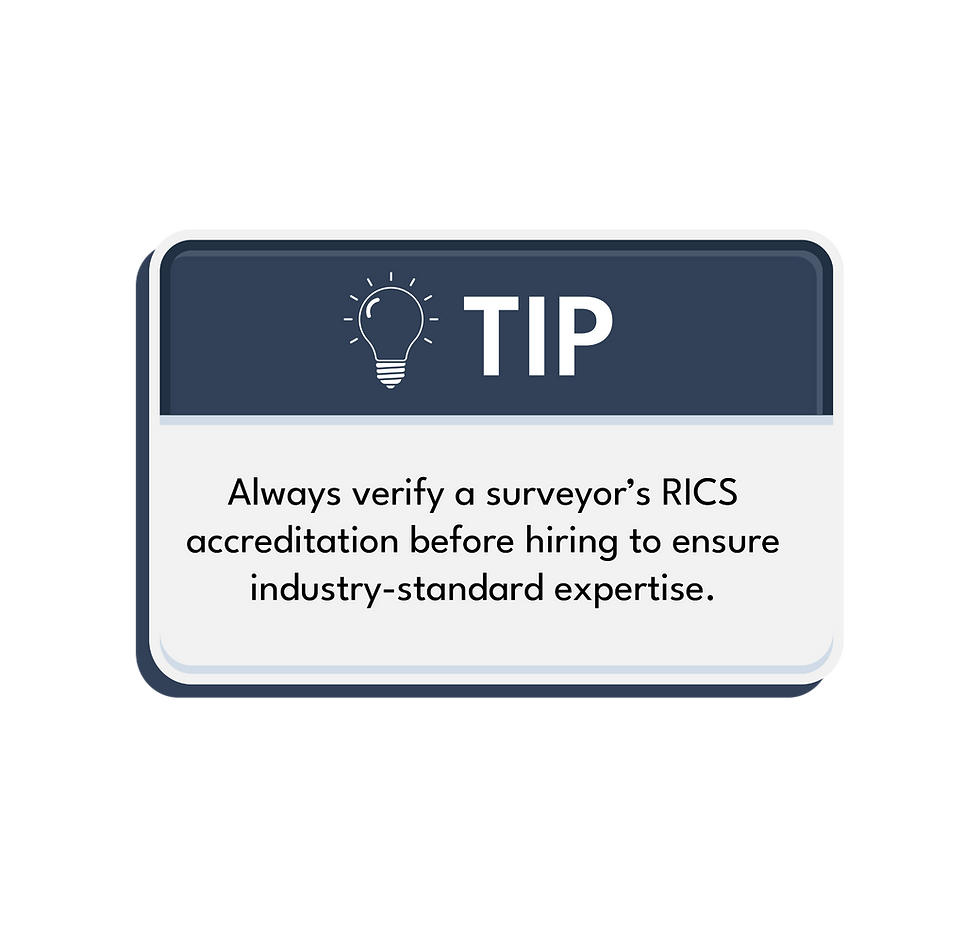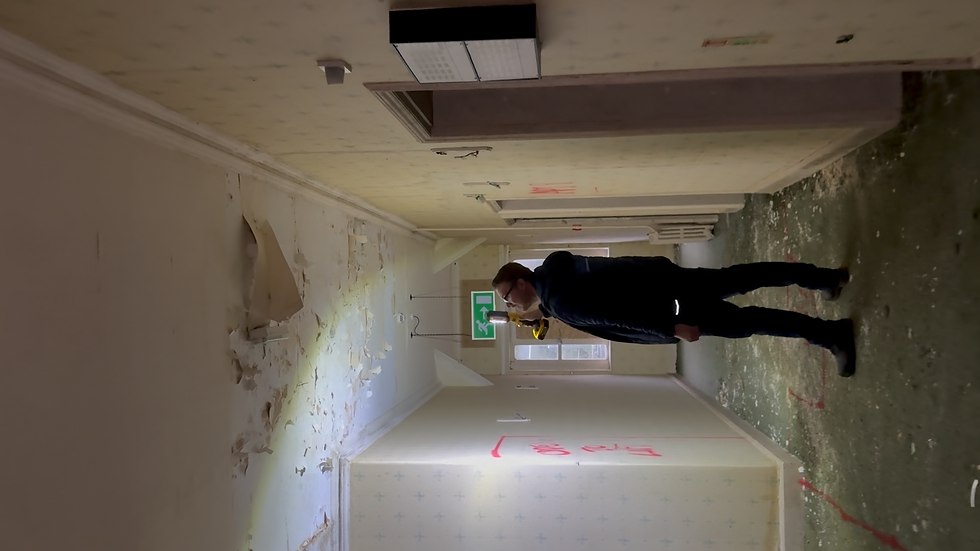How to Choose The Right Surveyor For Commercial Property Projects
- AMS SURVEYS
- Sep 26, 2025
- 5 min read
Updated: Oct 15, 2025
Commercial property projects, whether you are purchasing, leasing, or managing a building, are significant investments. Unlike residential properties, commercial buildings often come with more complex structures, higher compliance requirements, and greater financial risks. That’s why choosing the right surveyor for commercial property projects is so important.
A skilled surveyor can help identify structural issues, ensure compliance with regulations, and provide detailed property condition reports that guide smarter decisions. On the other hand, hiring the wrong surveyor could mean overlooking hidden defects, underestimating maintenance costs, or facing legal setbacks further down the line. In this guide, we’ll explore what makes a good commercial building surveyor, the key qualifications and experience to look for, and common pitfalls to avoid. By the end, you’ll have a clearer picture of how to choose the right professional to safeguard your investment.
Why Hiring the Right Surveyor Matters
When managing commercial property or taking on a new project, the right surveyor plays a pivotal role in protecting your finances and ensuring the long-term success of your venture. Their insights go beyond spotting obvious wear and tear and they provide expert analysis that helps you plan strategically.
Risk mitigation
A surveyor will uncover hidden issues such as structural weaknesses, damp, or asbestos that could otherwise go unnoticed. By identifying these risks early, you avoid sudden repair costs or health and safety liabilities.
Cost savings
Commercial properties require significant upkeep, and unexpected repairs can quickly escalate. A detailed property condition report from a surveyor helps you budget realistically, negotiate purchase or lease terms, and prevent costly surprises.
Informed decision-making
Whether you are buying, leasing, or refurbishing a commercial building, a surveyor’s expertise allows you to make decisions based on facts rather than assumptions. This ensures your project remains financially viable.
Long-term management
Beyond the initial purchase or lease, surveyors can help with ongoing property management. Their advice ensures you maintain compliance with safety standards and plan for future maintenance, extending the life of your building.

What to Look for in a Surveyor for Commercial Property
Choosing the right commercial building surveyor isn’t just about finding someone who can produce a report. It’s about selecting a professional who understands the unique demands of commercial buildings and can guide you through every stage of the process with confidence. Here are the key factors to consider:
RICS Accreditation
One of the first things to check is whether the surveyor is accredited by the Royal Institution of Chartered Surveyors (RICS). RICS accreditation is the gold standard in the property industry, ensuring the surveyor works to strict professional and ethical standards. A RICS-accredited surveyor has proven expertise, up-to-date training, and must adhere to a regulated code of conduct. By choosing an RICS surveyor, you can be confident that their advice is reliable and widely recognised by lenders, solicitors, and insurers.
Relevant Experience
Not all surveyors are the same. Commercial buildings are often far more complex than residential properties, which means you need someone with specific commercial expertise. It's important to look for surveyors who have experience with the type of property you are dealing with, whether that’s offices, warehouses, retail units, or mixed-use developments. An experienced commercial surveyor will understand the challenges of managing commercial property, from maintenance needs to compliance with accessibility and safety regulations. Ask for examples of previous projects or references from similar clients to ensure they have the right background.
Professional Indemnity Insurance
Even the most skilled surveyors can make mistakes, and this is where professional indemnity insurance is essential. This insurance protects you financially if the surveyor provides incorrect advice or overlooks a serious defect. Without insurance, you could be left covering costly repairs yourself. Always ask to see proof of insurance before hiring a surveyor for commercial property projects.
Knowledge of Local Regulations
Commercial building projects are subject to strict planning laws, safety codes, and environmental regulations, which vary by location. A surveyor with strong local knowledge can flag any restrictions or legal requirements that might impact your project. They’ll also be familiar with regional construction practices and common building issues in the area. This insight can help avoid delays, disputes, and unexpected costs further down the line.

The Costs Involved and How to Assess Them
Hiring a surveyor for commercial property is an investment, but understanding the costs involved will help you assess value rather than just the price tag. Surveyor fees can vary depending on the size, complexity, and location of the commercial building, so it’s important to know what to expect.
How fees are charged
Commercial building surveyors may charge a flat rate, an hourly fee, or calculate costs based on the property’s size. For large or complex sites, expect higher fees, as surveys take longer and require more detailed assessments.
What influences cost?
Factors such as the age of the building, its intended use, and the scope of the survey can all affect pricing. For example, a full property condition report on a historic commercial building will usually cost more than a standard assessment of a modern office.
Balancing price with value
While it may be tempting to choose the cheapest option, remember that an experienced surveyor can often save you money in the long run by identifying costly issues early. Think of the fee as an insurance policy against hidden risks.
Getting quotes
Always request detailed, written quotes from at least two or three commercial building surveyors. Make sure each quote clearly outlines what’s included, such as property condition reports, compliance checks, or follow-up advice, so you can compare like for like.
Common Pitfalls to Avoid When Hiring a Commercial Property Surveyor
Even with the best intentions, it’s easy to make mistakes when choosing a surveyor. Being aware of common pitfalls can help you steer clear of costly problems.
Choosing solely on cost
The lowest quote may look attractive, but if the surveyor lacks experience or specialist knowledge, you could end up paying far more in unexpected repairs. Always prioritise qualifications and expertise over price.
Not checking references or reviews
A reputable commercial building surveyor should have positive feedback from past clients. Don’t hesitate to ask for references, or check online reviews, to verify their track record.
Failing to confirm RICS accreditation
Some surveyors may advertise commercial property services without being RICS-accredited. This could compromise the quality of their advice and the credibility of their reports.
Unclear scope of work
One of the most common issues is hiring a surveyor without confirming what their service covers. For example, does their property condition report include structural elements, compliance checks, or only visible defects? Clarifying this upfront avoids misunderstandings later.
AMS Surveys
Looking for RICS Chartered Building Surveyors & Engineers? Look no further. Here at AMS Surveys, we specialise in a range of residential, commercial and heritage projects, from detailed property condition reports and structural inspections to full building surveys and compliance checks. Our expert team combines technical knowledge with local insight to deliver clear, practical advice that helps you make confident decisions about your property. Get in touch today.

%204K%20AMS%20SURVEYS%20LOGO.png)



